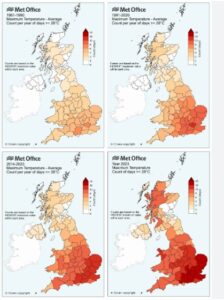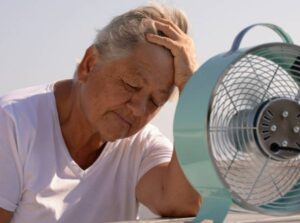🌡️ Extreme Heat & Climate-Driven Health Risks in the UK: What You Need to Know
“The UK is heating up — literally. With record-breaking temperatures becoming the norm, it’s time to prepare for the heatwaves ahead.”

A photo of a parched park or dry grassland in London during a summer heatwave
🔥 Why Is the UK Getting Hotter?
In recent years, the UK has seen unprecedented spikes in summer temperatures — including the 2022 record of 40.3°C in Coningsby, Lincolnshire. These aren’t just one-off events. Climate change, primarily caused by greenhouse gas emissions, is shifting the UK’s weather patterns towards hotter, drier summers.

A climate map or graph showing UK temperature trends over the past decades
☠️ Health Risks of Extreme Heat
Heat isn’t just uncomfortable — it can be deadly. According to Public Health England, thousands of excess deaths are linked to heatwaves in recent years. Here’s what to watch for:
1. Heat Exhaustion & Heatstroke
Early signs include dizziness, nausea, headaches, and confusion. If untreated, it can escalate into life-threatening heatstroke.
2. Dehydration
Hot weather increases fluid loss through sweating. Without enough water, you risk fatigue, heat cramps, and kidney strain.
3. Breathing Difficulties
Higher heat means more pollen and air pollution, which worsens conditions like asthma and COPD.
4. Heart Strain
Heat forces the heart to work harder to cool the body, raising risks for those with cardiovascular disease.


✅ How to Protect Yourself During Heatwaves
Here are practical, UK-specific tips to stay safe and cool:
💧 1. Stay Hydrated
Drink water regularly.
Avoid alcohol and caffeinated drinks.
Carry a refillable bottle when out.
🪟 2. Keep Your Home Cool
Close curtains and blinds during the day.
Open windows at night when it’s cooler.
Use electric fans or a bowl of ice in front of a fan for extra cooling.
👕 3. Dress for the Weather
Light, loose cotton clothing.
A wide-brimmed hat and sunglasses outdoors.
SPF 30+ sunscreen on exposed skin.
⏰ 4. Time Your Activities
Avoid the sun between 11 a.m. – 3 p.m.
Exercise early morning or late evening.
Take frequent breaks if working outside.
🧊 5. Use Cooling Tricks
Cold showers or sponge baths.
Keep a cool pack on your neck or wrists.
Chill your bedding before sleep.
👵 6. Check On Others
Keep in touch with elderly neighbours, friends, or relatives.
Make sure children and pets are never left in parked cars — even for a minute.
🏙️ Urban Heat & Long-Term Solutions
Cities like London, Manchester, and Birmingham suffer from the urban heat island effect, where concrete and tarmac trap heat. Solutions include:
Planting trees & green roofs
Better home insulation
Community cooling centres
Sustainable urban design
🌍 Climate Action Is Health Action
While we adapt to the heat, tackling climate change at its root is essential. Support policies that reduce emissions, improve housing standards, and invest in clean energy.
Remember: Every degree of temperature rise increases health risks — but every action counts to reduce the damage.
📣 Final Tip:
Stay informed. Stay hydrated. And stay cool. Your body will thank you for it.